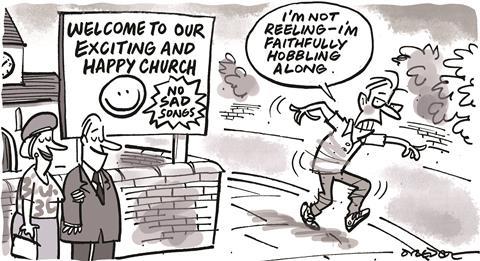If your journey of faith feels like a faithful hobble rather than a sprint, then be encouraged says Jeff Lucas, and don’t give up

I’ve written before about my skirmishes with clinical depression. I became a full-time pastor at the tender age of 22, and when emotional clouds first gathered, they came without a weather warning.
Back then, there wasn’t much conversation about mental health in church circles. And for a leader, emotional struggles were intensified by what felt like deafening silence. Not only did I feel bad, but I felt bad because I felt bad. The shadows were not brightened by the well-meaning counsel of a few Christian friends. I was told to pray more, trust more, repent, get over it and even encouraged to send a demon or two packing.
Not helpful.
More recently, I’ve navigated a season of bereavements, family health issues and some acts of betrayal from fellow believers and leaders. These combined to forge a fist – a knockout punch that has not put me flat on my back but has certainly left me reeling.
This has led me to the rather uncomfortable conclusion that faith can sometimes actually contribute to depression rather than be a certain antidote for it. Before anyone is tempted to pick up a stone and lob it my way, let me explain.
If there’s no rhyme or reason for anything in the universe – if we’re all just blobs of flesh, the product of evolutionary soup and nothing more – then there’s nothing to be disappointed about when life is tinged or shrouded by tragedy. The soul is not disappointed because there is no expectation. But for those who that believe in a God who is involved, loving and interventional, it can be a tad trickier.
I admire the faith of Elijah, not least because I haven’t raised the dead or summoned fire from heaven recently. Yet he was also found holed up in a dank cave of despair, his perspective warped by outraged disappointment – not only in life but in God. Another prophet, Jeremiah, was having more than a rough day when he cursed the day of his birth and the mother who bore him, before accusing God of deceit.
We know that life is harsh and we shouldn’t be surprised at trial yet, deep down, we don’t want to believe those sobering truths.
And then some live in church cultures where Christians are required to be happy and excited all the time, and especially on Sunday mornings. Thankfully, we’re having better conversations about mental health these days, and the calls for worship songs expressing lament have been many. But sad songs are difficult to compose and tough to sing, especially when we’re all supposed to be consistently sunning ourselves on the happy beach called Victory.
Shame can be another challenge. Christians are acutely aware of the call to holiness, and those serious about their faith seek, with God’s help, to align themselves with what he wants. But when failure comes, and we refuse to accept God’s stunning acceptance, grace and pardon, the burden can become crushing. Some believers have told me that they just don’t “feel forgiven”, as if genuine repentance should produce something like a twelve-volt electrical charge that sparks between our ears, signalling that forgiveness has been granted.
In truth, we accept grace in the same way that we came to Christ in the first place – by faith. So, if your journey of faith currently feels like a faithful hobble rather than a sprint, please be encouraged – and don’t give up. Jesus is still “the way and the truth and the life” (John 14:6).
And spare a thought – or better still, a prayer – for those called to lead in God’s beautiful, bewildering family. Because they are also human, and they might be limping, too.






































1 Reader's comment